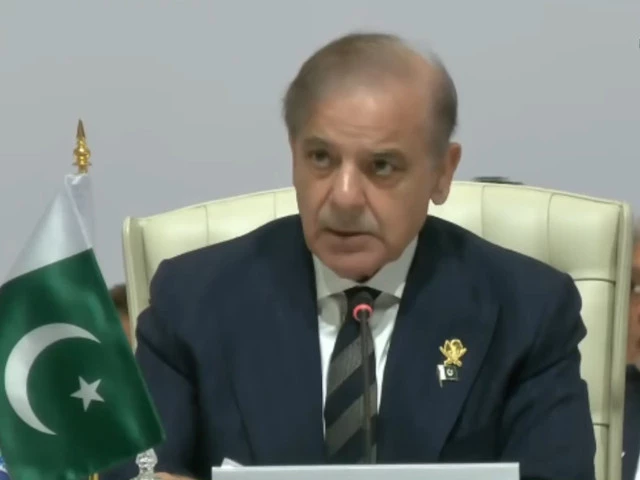ISLAMABAD:
Prime Minister Shehbaz Sharif, along with the leaders of six Islamic countries, will meet US President Donald Trump on Tuesday (tomorrow) on the sidelines of the United Nations General Assembly (UNGA), the Foreign Office said in a statement on Sunday.
Shehbaz will lead Pakistan’s delegation at annual UNGA session in New York from September 22 to 26. The prime minister will be accompanied by Deputy Prime Minister and Foreign Minister Senator Ishaq Dar, senior ministers, and top officials according to the Foreign Office.
President Trump has invited leaders of Pakistan, Saudi Arabia, Turkey, Qatar, the United Arab Emirates (UAE), Indonesia, and Egypt for a joint meeting, it is learnt. The Foreign Office said the leaders will “exchange views on issues pertaining to regional and international peace and security”.
Diplomatic sources told The Express Tribune that a separate bilateral meeting between Shehbaz and Trump is also under consideration. If it materialises, this will be the first direct interaction between the two leaders since Trump returned to the White House earlier this year.
The prime minister will address the United Nations General Assembly on 26 September. In his address to the general assembly, the prime minister will draw the attention of the international community towards the grave crisis in Gaza, and call for action to end the suffering of the Palestinians.
“The prime minister will urge the international community to resolve the situations of prolonged occupation and denial of the right to self-determination in Indian Illegally Occupied Jammu & Kashmir (IIOJK) and Palestine,” the Foreign Office stated.
“He will also highlight Pakistan’s perspective on the regional security situation, as well as other issues of international concern, including climate change, terrorism, Islamophobia, and sustainable development,” the statement added.
On the sidelines of the UNGA, Shehbaz will attend meetings of the UN Security Council (UNSC), the Global Development Initiative (GDI), and a special climate action summit. He is expected to participate in a conference on the two-state solution to the Palestine issue on Monday (today).
He is expected to underline Pakistan’s role as an elected member of the Security Council and reaffirm Islamabad’s resolve to work with all UN member states to uphold the UN Charter, prevent conflicts, and promote peace and prosperity. He is likely to attend a UNSC briefing on Israeli aggression in Palestine.
During the week-long visit, the prime minister will hold bilateral talks with a number of world leaders and senior UN officials to discuss issues of mutual interest. On Tuesday, he will also attend a reception hosted by the UN Secretary-General Antonio Guterres in honour of visiting heads of state.
According to the Prime Minister’s schedule, available to The Express Tribune, Shehbaz will meet Qatar’s Crown Prince Sheikh Sabah Al-Khalid, Jordan’s King Abdullah II, and Sri Lankan President Anura Kumara Dissanayake on Tuesday. He is also expected to meet Austrian Chancellor Christian Stocker.
Later on, he will take part in an international development meeting chaired by the Chinese premier, and attend a reception hosted by the US President for the world leaders. On Wednesday, Shehbaz is expected to meet philanthropist Bill Gates.
Also on Wednesday the prime minister will attend a climate change session chaired by the UN secretary-general and then a debate on Artificial Intelligence to be hosted by the South Korean President. On Thursday, he will attend a ceremony, marking the 30th anniversary of the Global Programme for Youth.
According to sources, during his stay, the prime minister may also meet with the prime ministers of China, Italy and Canada, the president of Iran, the emir of Qatar, the heads of European Union and the World Bank, as well as the managing director of the IMF — though these have not yet been scheduled.
Officials said Shehbaz’s participation in the “biggest annual gathering of world leaders” would reflect Pakistan’s commitment to multilateralism and provide a platform to highlight its longstanding contributions to peacekeeping, climate resilience, and sustainable development.

